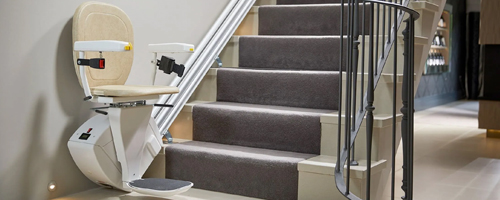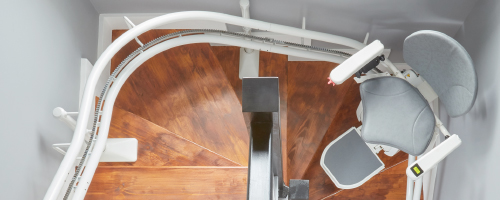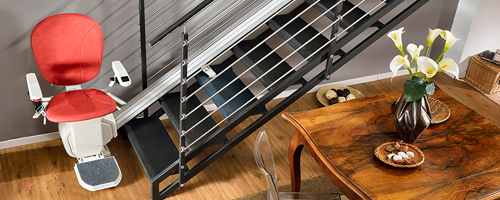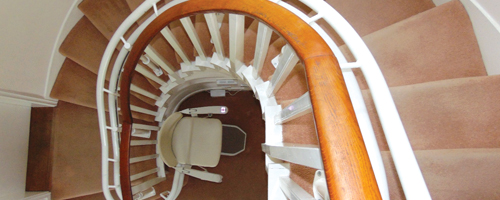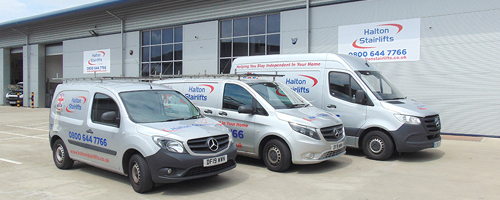Living with arthritis can be tough, especially when it comes to getting around everyday places like stairs. Having a stairlift can make a big difference for people with arthritis, giving them more freedom and control in their own homes.
By getting rid of the need to walk up and down stairs by hand, a stairlift helps cut down on joint strain and pain, letting people get around their homes easily and securely.
However, figuring out if a stairlift is the right choice involves thinking about your specific needs and situation. Things such as how bad your arthritis symptoms are, the setup of your home, and your overall health and mobility, all need to be considered.
Getting advice from healthcare professionals and mobility experts can help you figure out if a stairlift is right for someone with arthritis.
Ultimately, getting a stairlift can make a big difference in the lives of people with arthritis. It gives them more freedom to move around and helps them feel more secure at home. It’s important to check out all the choices and choose the one that fits the person’s needs and preferences the best.
What Exactly is Arthritis?
Arthritis is a condition that affects millions of people across the world with many variants being common among elderly people. According to Versus Arthritis, one of the most common forms of arthritis in the UK is osteoarthritis. Osteoarthritis differs from other types of arthritis in that it affects (and thins) a person’s bone cartilage.
The slow wearing down of cartilage in arthritis doesn’t just bring pain, but it can also make joints feel stiff and swollen, and limit movement, affecting your everyday activities and overall happiness.
Since arthritis is so common, there are plenty of different ways in which people can help the pain through medical means. Early detection and staying ahead of your health are crucial in slowing down the advancement of osteoarthritis and ensuring the best possible quality of life for those affected by it.
What Are the Symptoms?
Arthritis affects the joints. While any joint in the body can be affected, the condition most often tends to cause problems in a person’s back, hips, knees, feet and hands. Arthritis is known to be more common and often more severe in women.
Symptoms can vary from person to person, but often come and go in episodes. Things like damp weather, diet and exercise routines can all affect the frequency and severity of flare-ups.
If you’re experiencing joint tenderness, limited range of movement and pain or stiffness in your joints when you haven’t moved them for a while, then these may well be symptoms of arthritis. In the first instance, it’s always important to speak to your GP to get advice and a diagnosis if you’re concerned.
The Impact of Arthritis
Arthritis doesn’t just affect your ability to climb stairs – it affects all parts of your daily life. Walking, standing, and even sitting can all become tough activities for people with arthritis. Stiff and painful joints can make moving around feel like a big challenge.
Furthermore, being afraid of falling or making joint pain worse usually makes people avoid certain activities, which can limit their mobility and ability to take part in social and fun events.
Therefore, it’s very important to tackle mobility issues to help improve the overall well-being and functionality of people with arthritis. Using things like assistive devices, making changes to the home, and joining personalised exercise programs can make a big difference and help them live more active and fulfilling lives despite their arthritis.
Addressing Your Problems
If you are having difficulty with your mobility because of arthritis, it is important to address your issues as soon as possible to not aggravate your condition before you have looked into the potential options.
There are many different ways in which you can try and help your arthritis such as taking pain-killing medication, doing physical therapy, making some lifestyle changes, or even having surgery in extreme cases.
Can a Stairlift Help With Arthritis?
Carrying added weight can put an extra strain on a person’s joints, which can be particularly problematic if they’re already dealing with arthritis, to begin with.
Having a stairlift installed in your own home can help relieve symptoms associated with rheumatoid and osteoarthritis. Halton Stairlifts supplies heavy-duty stairlifts like the New Halton Curved Dual Rail HD Stairlift.
These models are specially designed to hold more weight, meaning that even heavier users can travel up and down the stairs safely and more easily without straining or putting extra pressure on sensitive areas and joints.
Stairlift Support With Halton Stairlifts
Is arthritis pain or inflammation when you walk making it difficult to get up and down the stairs? If you or someone you care for has a condition that could benefit from having an accessible stair lift 24/7, then you may well be considering having one installed in your home.
When choosing a stairlift to help with arthritis-related mobility issues, it’s important to pick a reliable unit that fits your needs. At Halton Stairlifts, we understand the importance of finding the right solution to better your mobility and independence at home.
We’ve got a wide selection of high-quality stairlifts to choose from, so you’re sure to find the perfect one for your home and lifestyle, no matter what kind of stairs you have.
Our team of experts is here for you every step of the way, from our first chat to getting your stairlift installed. We always put your comfort, safety, and happiness first, making sure you get a stairlift that goes above and beyond what you’re looking for.
Call Halton Stairlifts on 0800 644 7766 for a no-obligation quote, or to find out more about Halton’s full range of curved and straight stairlift installation options in your area.

Neil is the founder of Halton Stairlifts. He has years of experience installing stairlifts across the UK. With an eagerness to help those with mobility issues get up the stairs, Neil understands how important it is for a seamless and straightforward approach to installing stairlifts to help those in need quickly.
